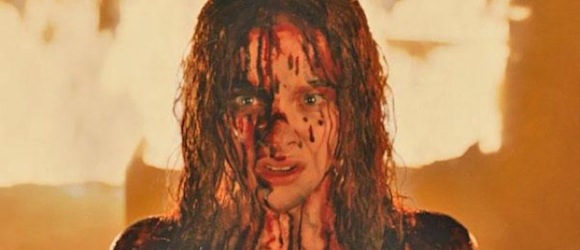Director Kimberly Peirce Likens Carrie To a Superhero Origin Story
Bloody Good Fun

I hate it when horror directors say things about their movies that make me want to see them, because I don’t like horror movies. I’m looking at you, Cabin in the Woods.
I wouldn’t go so far as to say I hate horror movies. Alien was certainly pretty great. I love scary books, and there’s pretty much no level of gore in comics that I won’t cackle gleefully at. But you’re talking to a chick who walked out her Film 101 screening of the original Texas Chainsaw Massacre twenty minutes in. As soon as that one chick got hung on a meathook, I was done.
So, thanks, Kimberly Peirce, for saying really interesting things about your Carrie movie. Thanks a lot.
See, Peirce is all up on the horror movie trope of the disgusting, weakening feminine, where women’s bodies betray them or a monster’s most “uncanny” feature is vaginal imagery. And if Stephen King‘s original inspiration for Carrie (finding a used tampon in the women’s shower while working as a janitor) was born out of an instinct that women’s bodies are disgusting, terrifying unknown quantities, she’s willing to tackle that head on:
It’s interesting I think when he brought up the idea of seeing tampons in a shower and being disgusted by it, that is a wonderful starting point for a horror film. And for a bizarre film. How many movies would actually show a tampon? How many movies would show a female menstruating? So that’s already an awkward grey zone. King’s paranoia and King’s fear is what makes this movie great. So let’s just say, we accept that. Also look at when Brian was making his movie in the 70s it was Women’s Lib. Female power was scary, I don’t think men, I don’t think people knew where it was going.
Peirce believes the reason why menstruation is such a good hook for a horror movie is not because it’s gross, but because it’s awkward, just like Carrie. There’s nothing wrong with menstruation and there’s nothing actually wrong with Carrie for getting her period, or for not knowing what’s happening to her. It’s the other girls, who make fun of her for being understandably unaware of her own body, who are villainaized. Heroic female monsters are few and far between, but Carrie is one of them.
More than that, Peirce sees her as a hero, referring to the first act of the movie as a “superhero origins story,” with Carrie discovering her telekinetic powers and pursuing a mastery of them. Take a look at the whole interview over at io9.
Have a tip we should know? tips@themarysue.com